Gellan Gum/Alginate Microparticles as Drug Delivery Vehicles: DOE Production Optimization and Drug Delivery
Abstract
1. Introduction
2. Results
2.1. Production and Optimization of Particles
2.1.1. Microparticle’s Size
2.1.2. Dispersibility: COV and SPAN
2.2. Drying and Swelling of the Microparticles
2.3. Encapsulation Efficiency and Loading Capacity
2.4. FTIR and TGA
2.5. Degradation
2.6. In Vitro Drug Release and Mathematical Model Fitting
3. Discussion
4. Materials and Methods
4.1. Materials
4.2. Production and Optimization of Particles Using DoE
4.3. Morphological Characterization
4.4. Swelling
4.5. In Vitro Degradation
4.6. Encapsulation Efficiency and Loading Capacity
4.7. In Vitro Fourier-Transform Infrared Spectroscopy (FTIR) and Thermogravimetric Analysis (TGA)
4.8. In Vitro Drug Release
5. Conclusions
Author Contributions
Funding
Institutional Review Board Statement
Informed Consent Statement
Data Availability Statement
Conflicts of Interest
References
- Kim, K.K.; Pack, D.W. Microspheres for Drug Delivery. BioMEMS Biomed. Nanotechnol. Chapter 2 2006, 19–50. [Google Scholar] [CrossRef]
- Lengyel, M.; Kállai-Szabó, N.; Antal, V.; Laki, A.J.; Antal, I. Microparticles, Microspheres, and Microcapsules for Advanced Drug Delivery. Sci. Pharm. 2019, 87, 20. [Google Scholar] [CrossRef]
- Iordache, T.; Banu, N.D.; Giol, E.D.; Vuluga, D.M.; Jerca, F.A.; Jerca, V.V. Factorial design optimization of polystyrene microspheres obtained by aqueous dispersion polymerization in the presence of poly(2-ethyl-2-oxazoline) reactive stabilizer. Polym. Int. 2020, 69, 1122–1129. [Google Scholar] [CrossRef]
- Sakaeda, T.; Hirano, K. O/W Lipid Emulsions for Parenteral Drug Delivery. III. Lipophilicity Necessary for Incorporation in Oil Particles Even After Intravenous Injection. J. Drug Target. 1998, 6, 119–127. [Google Scholar] [CrossRef]
- Kietzmann, D.; Béduneau, A.; Pellequer, Y.; Lamprecht, A. pH-sensitive microparticles prepared by an oil/water emulsification method using n-butanol. Int. J. Pharm. 2009, 375, 61–66. [Google Scholar] [CrossRef] [PubMed]
- Grenha, A.; Gomes, M.E.; Rodrigues, M.; Santo, V.E.; Mano, J.F.; Neves, N.M.; Reis, R.L. Development of new chitosan/carrageenan nanoparticles for drug delivery applications. J. Biomed. Mater. Res. Part A 2009, 92, 1265–1272. [Google Scholar] [CrossRef] [PubMed]
- Obaidat, R.M.; Alnaief, M.; Mashaqbeh, H. Investigation of Carrageenan Aerogel Microparticles as a Potential Drug Carrier. AAPS PharmSciTech 2018, 19, 2226–2236. [Google Scholar] [CrossRef]
- Čalija, B.; Cekić, N.; Savić, S.; Daniels, R.; Marković, B.; Milić, J. Ph-sensitive microparticles for oral drug delivery based on alginate/oligochitosan/Eudragit® L100-55 “sandwich” polyelectrolyte complex. Colloids Surf. B Biointerfaces 2013, 110, 395–402. [Google Scholar] [CrossRef]
- Zheng, W. A water-in-oil-in-oil-in-water (W/O/O/W) method for producing drug-releasing, double-walled microspheres. Int. J. Pharm. 2009, 374, 90–95. [Google Scholar] [CrossRef]
- Michelon, M.; Leopércio, B.C.; Carvalho, M.S. Microfluidic production of aqueous suspensions of gellan-based microcapsules containing hydrophobic compounds. Chem. Eng. Sci. 2020, 211, 115314. [Google Scholar] [CrossRef]
- Lababidi, N.; Sigal, V.; Koenneke, A.; Schwarzkopf, K.; Manz, A.; Schneider, M. Microfluidics as tool to prepare size-tunable PLGA nanoparticles with high curcumin encapsulation for efficient mucus penetration. Beilstein J. Nanotechnol. 2019, 10, 2280–2293. [Google Scholar] [CrossRef] [PubMed]
- Khan, I.U.; Serra, C.A.; Anton, N.; Vandamme, T. Microfluidics: A focus on improved cancer targeted drug delivery systems. J. Control. Release 2013, 172, 1065–1074. [Google Scholar] [CrossRef] [PubMed]
- Finotelli, P.V.; Da Silva, D.; Sola-Penna, M.; Rossi, A.M.; Farina, M.; Andrade, L.R.; Takeuchi, A.Y.; Rocha-Leão, M.H. Microcapsules of alginate/chitosan containing magnetic nanoparticles for controlled release of insulin. Colloids Surf. B Biointerfaces 2010, 81, 206–211. [Google Scholar] [CrossRef] [PubMed]
- Wen, H.; Gao, T.; Fu, Z.; Liu, X.; Xu, J.; He, Y.; Xu, N.; Jiao, P.; Fan, A.; Huang, S.; et al. Enhancement of membrane stability on magnetic responsive hydrogel microcapsules for potential on-demand cell separation. Carbohydr. Polym. 2017, 157, 1451–1460. [Google Scholar] [CrossRef]
- Ramana Reddy, K.V.; Gupta, J.; Izharuddin, P. Alginate Microspheres: The Innovative Approaches to Production of the Microbeads/Micro-Particles. J. Drug Deliv. Ther. 2019, 9, 774–781. [Google Scholar] [CrossRef]
- Prüsse, U.; Bilancetti, L.; Bučko, M.; Bugarski, B.; Bukowski, J.; Gemeiner, P.; Lewińska, D.; Manojlovic, V.; Massart, B.; Nastruzzi, C.; et al. Comparison of different technologies for alginate beads production. Chem. Pap. 2008, 62, 364–374. [Google Scholar] [CrossRef]
- Enayati, M.; Ahmad, Z.; Stride, E.; Edirisinghe, M. Preparation of Polymeric Carriers for Drug Delivery with Different Shape and Size Using an Electric Jet. Curr. Pharm. Biotechnol. 2010, 10, 600–608. [Google Scholar] [CrossRef]
- Park, S.; Hwang, S.; Lee, J. pH-responsive hydrogels from moldable composite microparticles prepared by coaxial electro-spray drying. Chem. Eng. J. 2011, 169, 348–357. [Google Scholar] [CrossRef]
- Noor, I.S.M.; Majid, S.R.; Arof, A.K.; Djurado, D.; Neto, S.C.; Pawlicka, A. Characteristics of gellan gum–LiCF3SO3 polymer electrolytes. Solid State Ion. 2012, 225, 649–653. [Google Scholar] [CrossRef]
- Workamp, M.; Alaie, S.; Dijksman, J.A. Coaxial air flow device for the production of millimeter-sized spherical hydrogel particles. Rev. Sci. Instrum. 2016, 87, 125113. [Google Scholar] [CrossRef]
- Patel, N.; Lalwani, D.; Gollmer, S.; Injeti, E.; Sari, Y.; Nesamony, J. Development and evaluation of a calcium alginate based oral ceftriaxone sodium formulation. Prog. Biomater. 2016, 5, 117–133. [Google Scholar] [CrossRef]
- Lee, K.Y.; Mooney, D.J. Alginate: Properties and biomedical applications. Prog. Polym. Sci. 2012, 37, 106–126. [Google Scholar] [CrossRef]
- Mahou, R.; Vlahos, A.E.; Shulman, A.; Sefton, M.V. Interpenetrating Alginate-Collagen Polymer Network Microspheres for Modular Tissue Engineering. ACS Biomater. Sci. Eng. 2018, 4, 3704–3712. [Google Scholar] [CrossRef]
- Bacelar, A.H.; Silva-Correia, J.; Oliveira, J.M.; Reis, R.L. Recent progress in gellan gum hydrogels provided by functionalization strategies. J. Mater. Chem. B 2016, 4, 6164–6174. [Google Scholar] [CrossRef]
- Prezotti, F.G.; Cury, B.S.F.; Evangelista, R.C. Mucoadhesive beads of gellan gum/pectin intended to controlled delivery of drugs. Carbohydr. Polym. 2014, 113, 286–295. [Google Scholar] [CrossRef]
- McMaster, L.D.; Kokott, S.A. Micro-encapsulation of Bifidobacterium lactis for incorporation into soft foods. World J. Microbiol. Biotechnol. 2005, 21, 723–728. [Google Scholar] [CrossRef]
- Pereira, D.R.; Silva-Correia, J.; Caridade, S.G.; Oliveira, J.T.; Sousa, R.A.; Salgado, A.J.; Oliveira, J.M.; Mano, J.F.; Sousa, N.; Reis, R.L.; et al. Development of gellan gum-based Microparticles/Hydrogel Matrices for Application in the Intervertebral Disc Regeneration. Tissue Eng. Part C Methods 2011, 17, 961–972. [Google Scholar] [CrossRef]
- Jana, S.; Das, A.; Nayak, A.K.; Sen, K.K.; Basu, S.K. Aceclofenac-loaded unsaturated esterified alginate/gellan gum microspheres: In vitro and in vivo assessment. Int. J. Biol. Macromol. 2013, 57, 129–137. [Google Scholar] [CrossRef]
- Akkineni, A.R.; Ahlfeld, T.; Funk, A.; Waske, A.; Lode, A.; Gelinsky, M. Highly Concentrated Alginate-Gellan Gum Composites for 3D Plotting of Complex Tissue Engineering Scaffolds. Polymers 2016, 8, 170. [Google Scholar] [CrossRef]
- Zheng, Y.; Liang, Y.; Zhang, D.; Sun, X.; Liang, L.; Li, J.; Liu, Y.-N. Gelatin-Based Hydrogels Blended with Gellan as an Injectable Wound Dressing. ACS Omega 2018, 3, 4766–4775. [Google Scholar] [CrossRef]
- Amer, M.H.; Rose, F.R.A.J.; Shakesheff, K.M.; Modo, M.; White, L.J. Translational considerations in injectable cell-based therapeutics for neurological applications: Concepts, progress and challenges. NPJ Regen. Med. 2017, 2, 23. [Google Scholar] [CrossRef] [PubMed]
- Quarta, E.; Sonvico, F.; Bettini, R.; De Luca, C.; Dotti, A.; Catalucci, D.; Iafisco, M.; Degli Esposti, L.; Colombo, G.; Trevisi, G.; et al. Inhalable microparticles embedding calcium phosphate nanoparticles for heart targeting: The formulation experimental design. Pharmaceutics 2021, 13, 1825. [Google Scholar] [CrossRef] [PubMed]
- Othman, I.; Abu Haija, M.; Kannan, P.; Banat, F. Adsorptive Removal of Methylene Blue from Water Using High-Performance Alginate-Based Beads. Water Air Soil Pollut. 2020, 231, 396. [Google Scholar] [CrossRef]
- Halim, N.F.A.; Majid, S.R.; Arof, A.K.; Kajzar, F.; Pawlicka, A. Gellan Gum-LiI Gel Polymer Electrolytes. Mol. Cryst. Liq. Cryst. 2012, 554, 232–238. [Google Scholar] [CrossRef]
- Khampieng, T.; Aramwit, P.; Supaphol, P. Silk sericin loaded alginate nanoparticles: Preparation and anti-inflammatory efficacy. Int. J. Biol. Macromol. 2015, 80, 636–643. [Google Scholar] [CrossRef]
- Carrêlo, H.; Soares, P.I.P.; Borges, J.P.; Cidade, M.T. Injectable Composite Systems Based on Microparticles in Hydrogels for Bioactive Cargo Controlled Delivery. Gels 2021, 7, 147. [Google Scholar] [CrossRef]
- Witzler, M.; Vermeeren, S.; Kolevatov, R.O.; Haddad, R.; Gericke, M.; Heinze, T.; Schulze, M. Evaluating Release Kinetics from Alginate Beads Coated with Polyelectrolyte Layers for Sustained Drug Delivery. ACS Appl. Bio Mater. 2021, 4, 6719–6731. [Google Scholar] [CrossRef]
- Boni, F.I.; Prezotti, F.G.; Cury, B.S.F. Gellan gum microspheres crosslinked with trivalent ion: Effect of polymer and crosslinker concentrations on drug release and mucoadhesive properties. Drug Dev. Ind. Pharm. 2016, 42, 1283–1290. [Google Scholar] [CrossRef] [PubMed]
- Xu, H.; Shi, M.; Liu, Y.; Jiang, J.; Ma, T. A Novel In Situ Gel Formulation of Ranitidine for Oral Sustained Delivery. Biomol. Ther. 2014, 22, 161–165. [Google Scholar] [CrossRef]
- Fredenberg, S.; Wahlgren, M.; Reslow, M.; Axelsson, A. The mechanisms of drug release in poly(lactic-co-glycolic acid)-based drug delivery systems—A review. Int. J. Pharm. 2011, 415, 34–52. [Google Scholar] [CrossRef]
- Bruschi, M.L. Strategies to Modify the Drug Release from Pharmaceutical Systems Related Titles; Elsevier: Cambridge, MA, USA, 2015. [Google Scholar]
- Costa, P.; Lobo, J.M.S. Modeling and comparision of dissolution profiles. Eur. J. Pharm. Sci. 2001, 13, 123–124. [Google Scholar] [CrossRef]
- Kim, H.; Fassihi, R. Application of binary polymer system in drug release rate modulation. 2. Influence of formulation variables and hydrodynamic conditions on release kinetics. J. Pharm. Sci. 1997, 86, 323–328. [Google Scholar] [CrossRef] [PubMed]
- Zuo, J.; Gao, Y.; Bou-Chacra, N.; Löbenberg, R. Evaluation of the DDSolver Software Applications. BioMed Res. Int. 2014, 2014, 204925. [Google Scholar] [CrossRef]
- Zhang, Y.; Huo, M.; Zhou, J.; Zou, A.; Li, W.; Yao, C.; Xie, S. DDSolver: An Add-In Program for Modeling and Comparison of Drug Dissolution Profiles. AAPS J. 2010, 12, 263–271. [Google Scholar] [CrossRef] [PubMed]
- Arifin, D.Y.; Lee, L.Y.; Wang, C.H. Mathematical modeling and simulation of drug release from microspheres: Implications to drug delivery systems. Adv. Drug Deliv. Rev. 2006, 58, 1274–1325. [Google Scholar] [CrossRef]
- Peppas, N.A.; Sahlin, J.J. A simple equation for the description of solute release. III. Coupling of diffusion and relaxation. Int. J. Pharm. 1989, 57, 169–172. [Google Scholar] [CrossRef]
- Osmalek, T.; Froelich, A.; Milanowski, B.; Bialas, M.; Hyla, K.; Szybowicz, M. pH-Dependent Behavior of Novel Gellan Beads Loaded with Naproxen. Curr. Drug Deliv. 2017, 15, 52–63. [Google Scholar] [CrossRef]
- Chan, E.S.; Lim, T.K.; Ravindra, P.; Mansa, R.F.; Islam, A. The effect of low air-to-liquid mass flow rate ratios on the size, size distribution and shape of calcium alginate particles produced using the atomization method. J. Food Eng. 2012, 108, 297–303. [Google Scholar] [CrossRef]
- Nastruzzi, A.; Pitingolo, G.; Luca, G.; Nastruzzi, C. DoE Analysis of Approaches for Hydrogel Microbeads’ Preparation by Millifluidic Methods. Micromachines 2020, 11, 1007. [Google Scholar] [CrossRef]
- Anani, J.; Noby, H.; Zkria, A.; Yoshitake, T.; ElKady, M. Monothetic Analysis and Response Surface Methodology Optimization of Calcium Alginate Microcapsules Characteristics. Polymers 2022, 14, 709. [Google Scholar] [CrossRef] [PubMed]
- Rizwan, M.; Yahya, R.; Hassan, A.; Yar, M.; Azzahari, A.D.; Selvanathan, V.; Sonsudin, F.; Abouloula, C.N. pH Sensitive Hydrogels in Drug Delivery: Brief History, Properties, Swelling, and Release Mechanism, Material Selection and Applications. Polymers 2017, 9, 137. [Google Scholar] [CrossRef]
- Zeeb, B.; Saberi, A.H.; Weiss, J.; McClements, D.J. Retention and release of oil-in-water emulsions from filled hydrogel beads composed of calcium alginate: Impact of emulsifier type and pH. Soft Matter 2015, 11, 2228–2236. [Google Scholar] [CrossRef]
- Rayment, P.; Wright, P.; Hoad, C.; Ciampi, E.; Haydock, D.; Gowland, P.; Butler, M.F. Investigation of alginate beads for gastro-intestinal functionality, Part 1: In vitro characterisation. Food Hydrocoll. 2009, 23, 816–822. [Google Scholar] [CrossRef]
- Narkar, M.; Sher, P.; Pawar, A. Stomach-Specific Controlled Release Gellan Beads of Acid-Soluble Drug Prepared by Ionotropic Gelation Method. AAPS PharmSciTech 2010, 11, 267–277. [Google Scholar] [CrossRef]
- Fan, D.Y.; Tian, Y.; Liu, Z.J. Injectable Hydrogels for Localized Cancer Therapy. Front. Chem. 2019, 7, 675. [Google Scholar] [CrossRef] [PubMed]
- Zhu, C.; Ding, Z.; Lu, Q.; Lu, G.; Xiao, L.; Zhang, X.; Dong, X.; Ru, C.; Kaplan, D.L. Injectable Silk–Vaterite Composite Hydrogels with Tunable Sustained Drug Release Capacity. ACS Biomater. Sci. Eng. 2019, 5, 6602–6609. [Google Scholar] [CrossRef]
- Temeepresertkij, P.; Iwaoka, M.; Iwamori, S. Molecular Interactions between Methylene Blue and Sodium Alginate Studied by Molecular Orbital Calculations. Molecules 2021, 26, 7029. [Google Scholar] [CrossRef] [PubMed]
- Uddin, M.T.; Islam, M.A.; Mahmud, S.; Rukanuzzaman, M. Adsorptive removal of methylene blue by tea waste. J. Hazard. Mater. 2009, 164, 53–60. [Google Scholar] [CrossRef]
- Guarino, V.; Caputo, T.; Altobelli, R.; Ambrosio, L. Degradation properties and metabolic activity of alginate and chitosan polyelectrolytes for drug delivery and tissue engineering applications. AIMS Mater. Sci. 2015, 2, 497–502. [Google Scholar] [CrossRef]
- Pawar, S.N.; Edgar, K.J. Alginate derivatization: A review of chemistry, properties and applications. Biomaterials 2012, 33, 3279–3305. [Google Scholar] [CrossRef]
- Augst, A.D.; Kong, H.J.; Mooney, D.J. Alginate Hydrogels as Biomaterials. Macromol. Biosci. 2006, 6, 623–633. [Google Scholar] [CrossRef]
- Zhao, X.; Wang, Z. A pH-sensitive microemulsion-filled gellan gum hydrogel encapsulated apigenin: Characterization and in vitro release kinetics. Colloids Surf. B Biointerfaces 2019, 178, 245–252. [Google Scholar] [CrossRef] [PubMed]
- Picone, C.S.F.; Cunha, R.L. Influence of pH on formation and properties of gellan gels. Carbohydr. Polym. 2011, 84, 662–668. [Google Scholar] [CrossRef]
- Su, J.; Xu, H.; Sun, J.; Gong, X.; Zhao, H. Dual delivery of BMP-2 and bFGF from a new nano-composite scaffold, loaded with vascular stents for large-size mandibular defect regeneration. Int. J. Mol. Sci. 2013, 14, 12714–12728. [Google Scholar] [CrossRef]
- Aranci, K.; Uzun, M.; Su, S.; Cesur, S.; Ulag, S.; Amin, A.; Guncu, M.M.; Aksu, B.; Kolayli, S.; Ustundag, C.B.; et al. 3D Propolis-Sodium Alginate Scaffolds: Influence on Structural Parameters, Release Mechanisms, Cell Cytotoxicity and Antibacterial Activity. Molecules 2020, 25, 5082. [Google Scholar] [CrossRef]
- Xu, Z.; Li, Z.; Jiang, S.; Bratlie, K.M. Chemically Modified Gellan Gum Hydrogels with Tunable Properties for Use as Tissue Engineering Scaffolds. ACS Omega 2018, 3, 6998–7007. [Google Scholar] [CrossRef]
- Silva-Correia, J.; Caridade, S.G.; Oliveira, J.T.; Sousa, R.A.; Mano, J.F.; Reis, R.L. Gellan gum-based hydrogels for intervertebral disc tissue-engineering applications. J. Tissue Eng. Regen. Med. 2010, 5, 97–107. [Google Scholar] [CrossRef] [PubMed]
- Barros, A.A.; Rita, A.; Duarte, C.; Pires, R.A.; Sampaio-Marques, B.; Ludovico, P.; Lima, E.; Mano, J.F.; Reis, R.L. Bioresorbable ureteral stents from natural origin polymers. J. Biomed. Mater. Res. Part B Appl. Biomater. 2015, 103, 608–617. [Google Scholar] [CrossRef]
- Caetano, L.A.; Almeida, A.J.; Gonçalves, L.M. Effect of Experimental Parameters on Alginate/Chitosan Microparticles for BCG Encapsulation. Mar. Drugs 2016, 14, 90. [Google Scholar] [CrossRef]
- de Farias, A.L.; Meneguin, A.B.; da Silva Barud, H.; Brighenti, F.L. The role of sodium alginate and gellan gum in the design of new drug delivery systems intended for antibiofilm activity of morin. Int. J. Biol. Macromol. 2020, 162, 1944–1958. [Google Scholar] [CrossRef]
- Tu, J.; Bolla, S.; Barr, J.; Miedema, J.; Li, X.; Jasti, B. Alginate microparticles prepared by spray–coagulation method: Preparation, drug loading and release characterization. Int. J. Pharm. 2005, 303, 171–181. [Google Scholar] [CrossRef]
- Voo, W.P.; Ooi, C.W.; Islam, A.; Tey, B.T.; Chan, E.S. Calcium alginate hydrogel beads with high stiffness and extended dissolution behaviour. Eur. Polym. J. 2016, 75, 343–353. [Google Scholar] [CrossRef]
- Dhanka, M.; Shetty, C.; Srivastava, R. Methotrexate loaded gellan gum microparticles for drug delivery. Int. J. Biol. Macromol. 2017, 110, 346–356. [Google Scholar] [CrossRef]
- Delgado, B.; Carrêlo, H.; Loureiro, M.V.; Marques, A.C.; Borges, J.P.; Cidade, M.T. Injectable hydrogels with two different rates of drug release based on pluronic/water system filled with poly(e-caprolactone) microcapsules. J. Mater. Sci. 2021, 56, 13416–13428. [Google Scholar] [CrossRef]
- Carrêlo, H.; Escoval, A.R.; Soares, P.I.P.; Borges, J.P.; Cidade, M.T. Injectable Composite Systems of Gellan Gum:Alginate Microparticles in Pluronic Hydrogels for Bioactive Cargo Controlled Delivery: Optimization of Hydrogel Composition based on Rheological Behavior. Fluids 2022, 7, 375. [Google Scholar] [CrossRef]
- Kumar, K.P.; Nivedita, G.; Karthikeyan, K. Tamoxifen Citrate Loaded Chitosan-Gellan Nanocapsules for Breast Cancer Therapy: Development, Characterisation and In-vitro Cell Viability Study. J. Microencapsul. 2018, 35, 292–300. [Google Scholar] [CrossRef]
- Shukla, S.K.; Mishra, A.K.; Arotiba, O.A.; Mamba, B.B. Chitosan-based nanomaterials: A state-of-the-art review. Int. J. Biol. Macromol. 2013, 59, 46–58. [Google Scholar] [CrossRef] [PubMed]
- Luo, Y.; Wang, Q. Recent development of chitosan-based polyelectrolyte complexes with natural polysaccharides for drug delivery. Int. J. Biol. Macromol. 2014, 64, 353–367. [Google Scholar] [CrossRef] [PubMed]
- Nisco. Available online: http://www.nisco.ch (accessed on 10 January 2022).

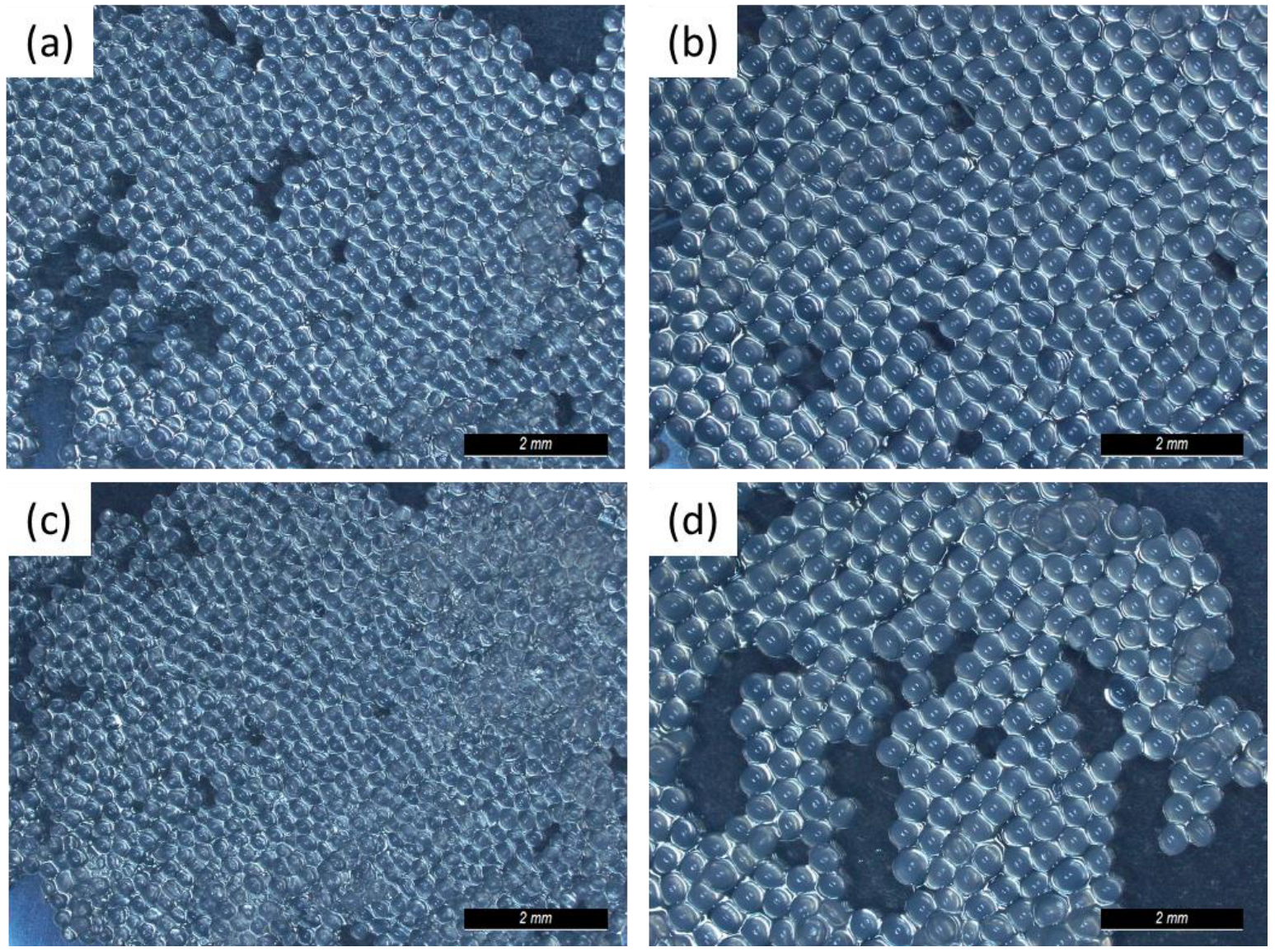
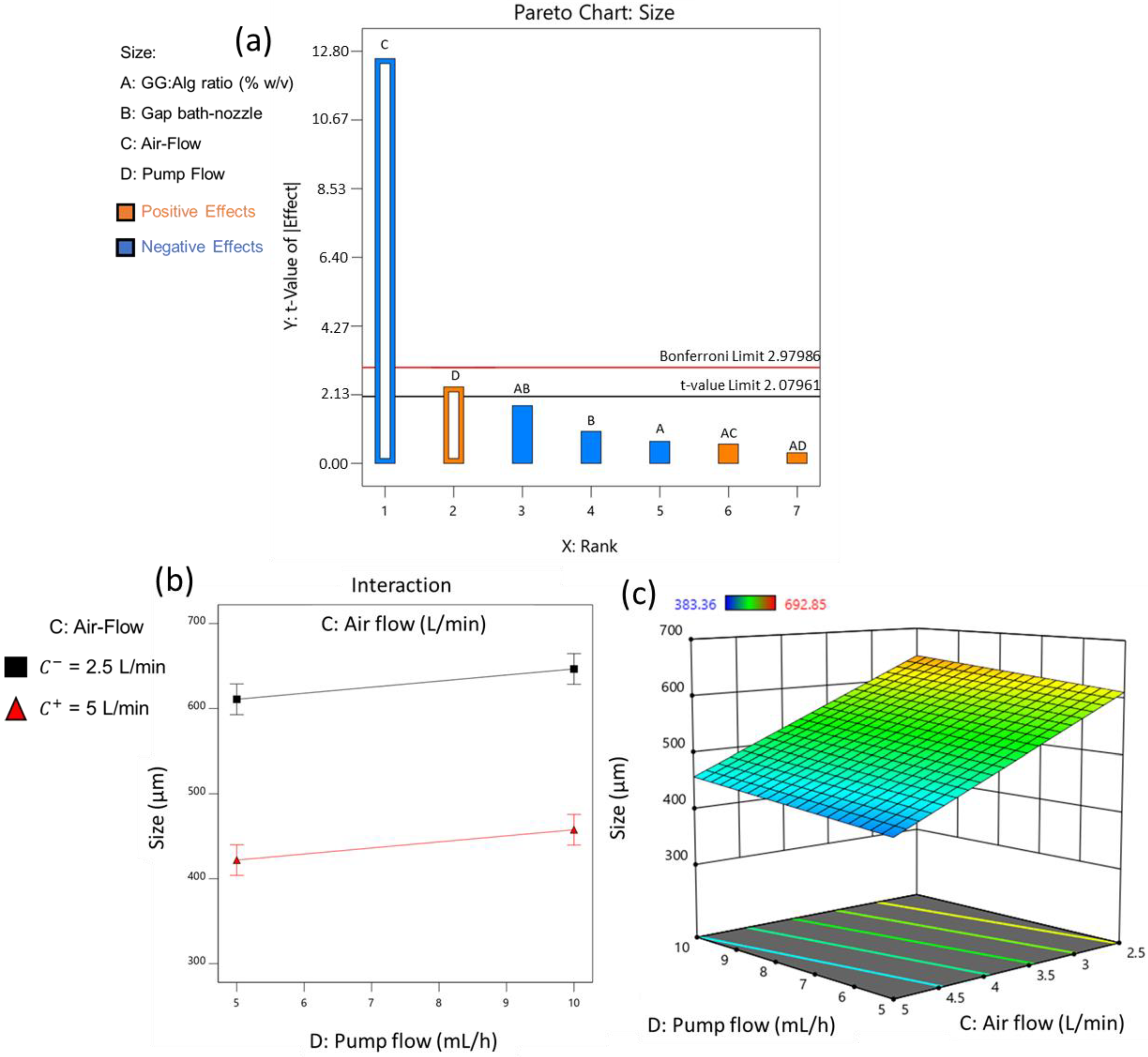

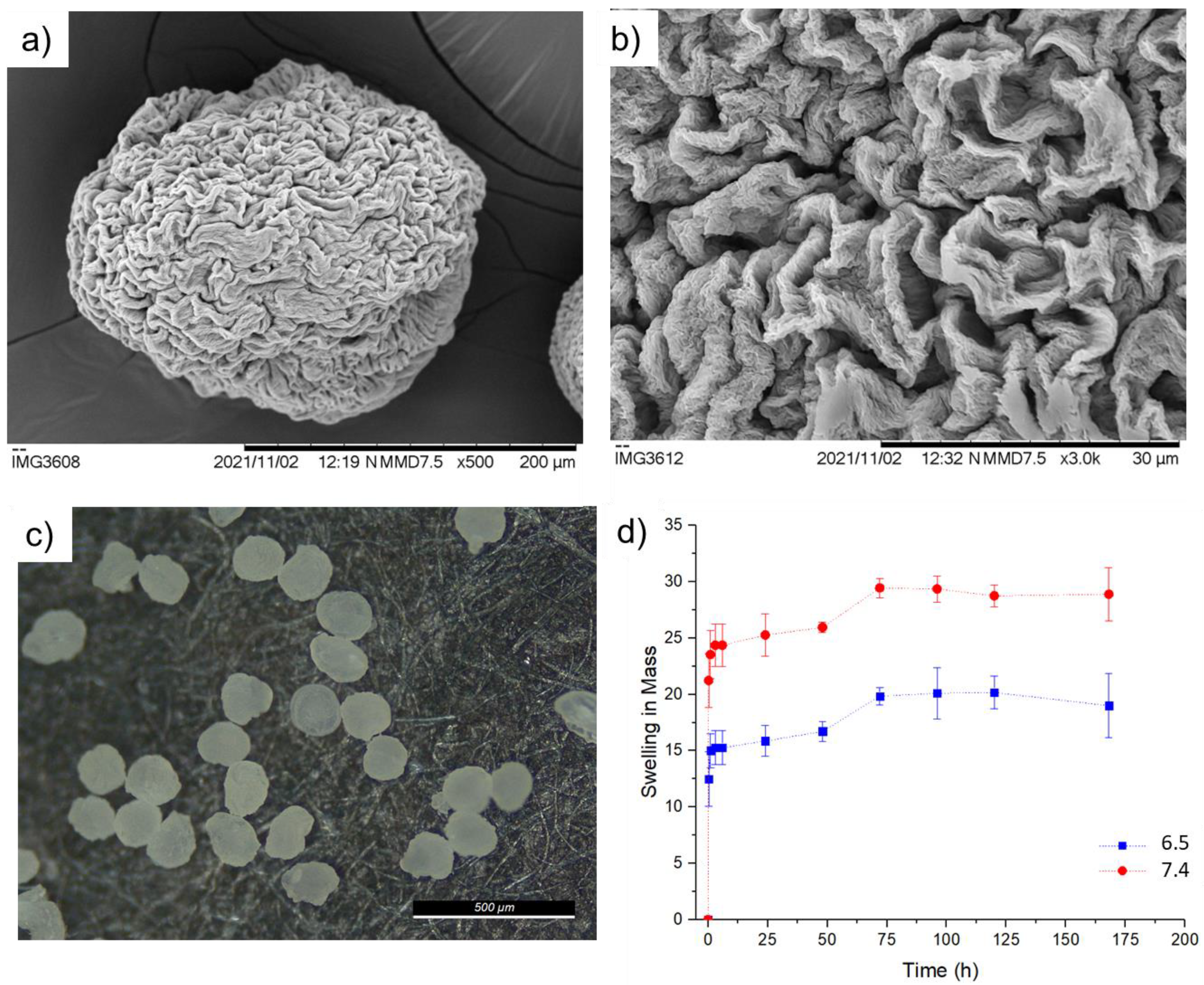
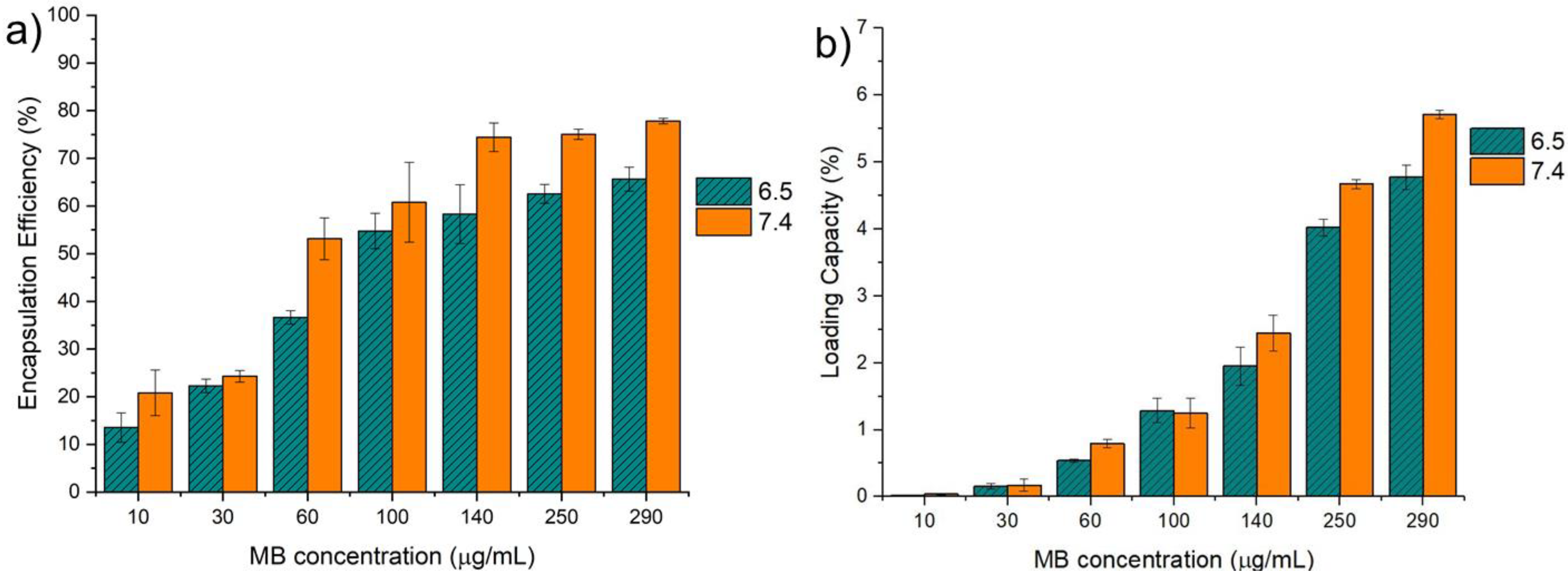

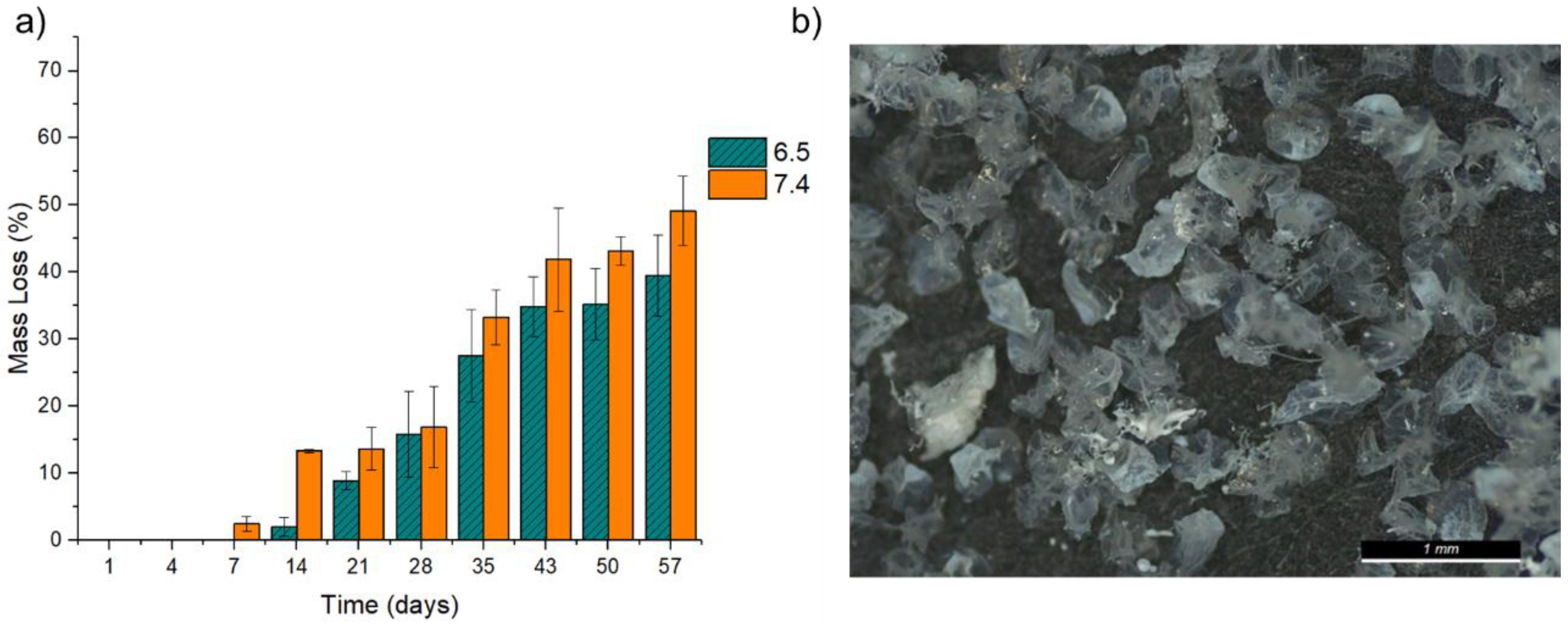
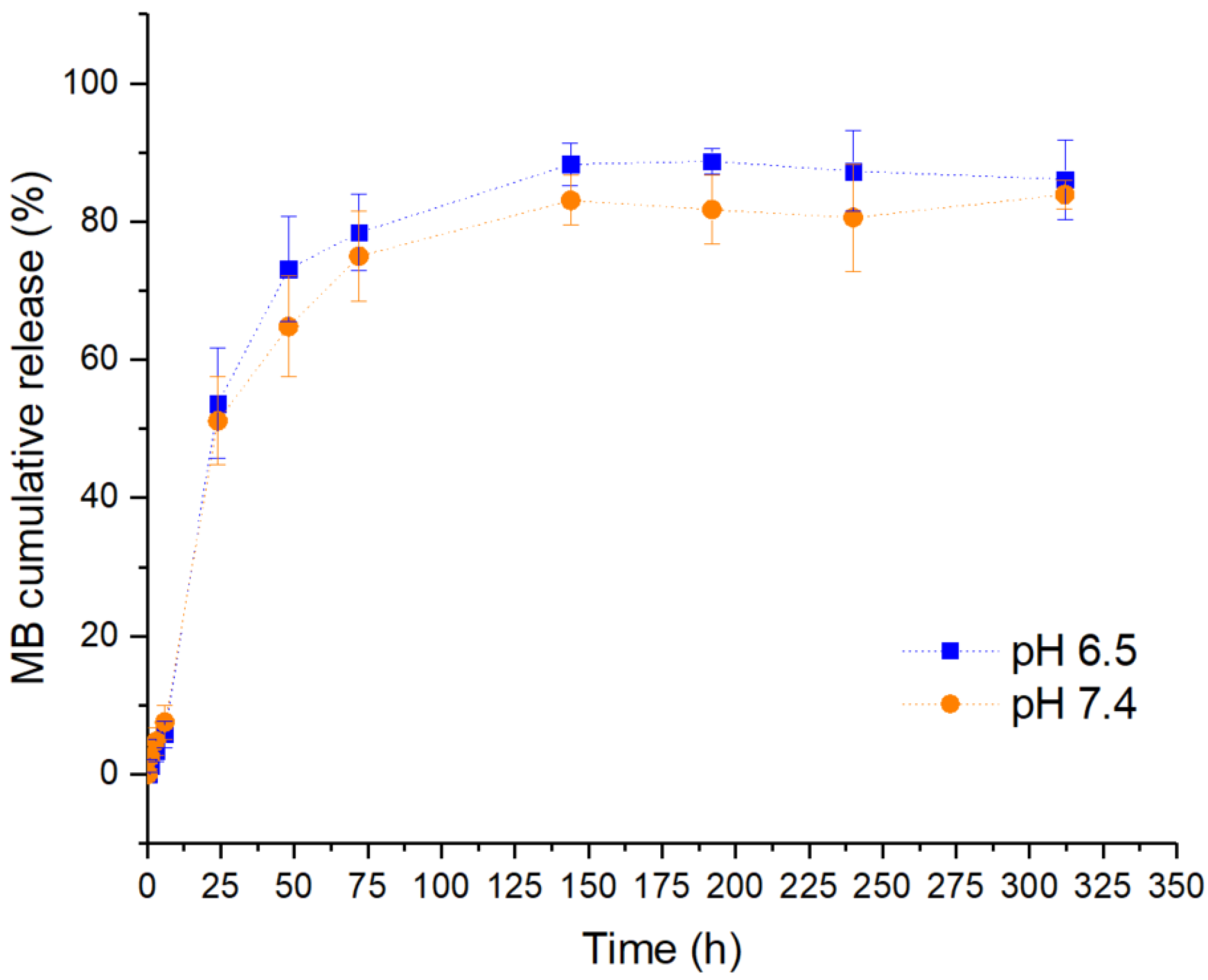
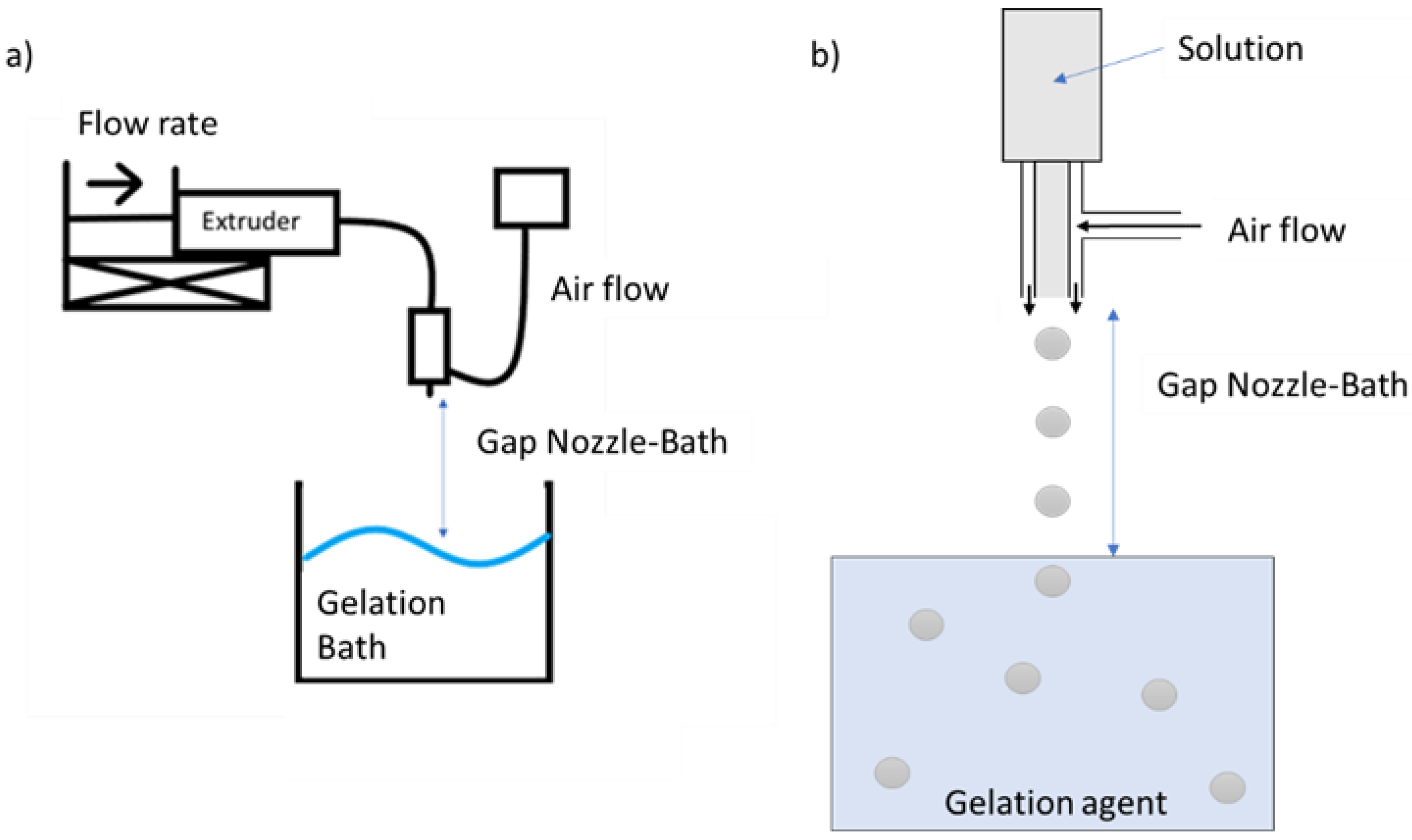
| RUN | FACTORS | RESPONSES | |||||
|---|---|---|---|---|---|---|---|
| A: GG: Alg Ratio (%) | B: Bath-Nozzle Gap (cm) | C: Air Flow (L/min) | D: Pump Flow (mL/h) | Size (µm) | COV | SPAN | |
| 1 | 25:75 | 20 | 5 | 10 | 383.4 | 0.0770 | 0.1969 |
| 2 | 50:50 | 20 | 5 | 5 | 434.6 | 0.0662 | 0.1486 |
| 3 | 50:50 | 10 | 2.5 | 5 | 652.6 | 0.0659 | 0.1582 |
| 4 | 50:50 | 10 | 5 | 10 | 496.1 | 0.0400 | 0.1611 |
| 5 | 25:75 | 20 | 2.5 | 5 | 617.6 | 0.0648 | 0.1610 |
| 6 | 25:75 | 10 | 5 | 5 | 427.0 | 0.1200 | 0.2460 |
| 7 | 25:75 | 20 | 5 | 10 | 441.7 | 0.0949 | 0.2311 |
| 8 | 25:75 | 10 | 5 | 5 | 418.1 | 0.1109 | 0.2496 |
| 9 | 50:50 | 20 | 2.5 | 10 | 666.9 | 0.0619 | 0.1473 |
| 10 | 50:50 | 10 | 2.5 | 5 | 607.4 | 0.0618 | 0.1447 |
| 11 | 25:75 | 10 | 2.5 | 10 | 649.0 | 0.0600 | 0.1447 |
| 12 | 50:50 | 20 | 5 | 5 | 453.3 | 0.0690 | 0.1740 |
| 13 | 25:75 | 10 | 2.5 | 10 | 655.6 | 0.0718 | 0.1723 |
| 14 | 50:50 | 20 | 2.5 | 10 | 619.5 | 0.0653 | 0.1604 |
| 15 | 50:50 | 10 | 5 | 10 | 435.0 | 0.0589 | 0.1505 |
| 16 | 50:50 | 10 | 2.5 | 5 | 591.0 | 0.0587 | 0.1623 |
| 17 | 25:75 | 20 | 5 | 10 | 490.6 | 0.0853 | 0.1935 |
| 18 | 50:50 | 20 | 2.5 | 10 | 692.8 | 0.0735 | 0.1838 |
| 19 | 50:50 | 20 | 5 | 5 | 405.2 | 0.0825 | 0.1752 |
| 20 | 25:75 | 10 | 2.5 | 10 | 676.4 | 0.0586 | 0.1679 |
| 21 | 50:50 | 10 | 5 | 10 | 418.4 | 0.0820 | 0.2185 |
| 22 | 25:75 | 20 | 2.5 | 5 | 527.9 | 0.0796 | 0.1928 |
| 23 | 25:75 | 20 | 2.5 | 5 | 588.0 | 0.0619 | 0.1646 |
| 24 | 25:75 | 10 | 5 | 5 | 474.1 | 0.0907 | 0.2184 |
| Source | Sum of Squares | df | Mean Square | F-Value | p-Value | |
|---|---|---|---|---|---|---|
| Model | 2.218 × 105 | 2 | 1.109 × 105 | 81.830 | <0.0001 | significant |
| C-Air flow | 2.141 × 105 | 1 | 2.141 × 105 | 158.020 | <0.0001 | |
| D-Pump flow | 7647.260 | 1 | 7647.260 | 5.640 | 0.0271 | |
| Residual | 28,455.610 | 21 | 1355.030 | |||
| Lack of Fit | 6958.180 | 5 | 1391.640 | 1.040 | 0.4303 | not significant |
| Pure Error | 21497.430 | 16 | 1343.590 | |||
| Cor Total | 2.502 × 105 | 23 |
| Source | Sum of Squares | df | Mean Square | F-Value | p-Value | |
|---|---|---|---|---|---|---|
| Model | 0.0043 | 3 | 0.0014 | 9.43 | 0.0004 | significant |
| A-Percentage in 2% | 0.0015 | 1 | 0.0015 | 9.93 | 0.0050 | |
| C-Air flow | 0.0016 | 1 | 0.0016 | 10.33 | 0.0044 | |
| AC | 0.0012 | 1 | 0.0012 | 8.02 | 0.0103 | |
| Residual | 0.0030 | 20 | 0.0002 | |||
| Lack of Fit | 0.0010 | 4 | 0.0002 | 1.96 | 0.1499 | not significant |
| Pure Error | 0.0020 | 16 | 0.0001 | |||
| Cor Total | 0.0073 | 23 |
| Source | Sum of Squares | df | Mean Square | F-Value | p-Value | |
|---|---|---|---|---|---|---|
| Model | 0.0148 | 3 | 0.0049 | 11.81 | 0.0001 | significant |
| A-Percentage in 2% | 0.0052 | 1 | 0.0052 | 12.48 | 0.0021 | |
| C-Air flow | 0.0068 | 1 | 0.0068 | 16.19 | 0.0007 | |
| AC | 0.0028 | 1 | 0.0028 | 6.78 | 0.0170 | |
| Residual | 0.0084 | 20 | 0.0004 | |||
| Lack of Fit | 0.0019 | 4 | 0.0005 | 1.17 | 0.3588 | not significant |
| Pure Error | 0.0065 | 16 | 0.0004 | |||
| Cor Total | 0.0232 | 23 |
| Time (h) | ANOVA Parameters between pH 6.5 and 7.4 |
|---|---|
| 24 | F(1,8) = 0.311, p = 0.592 |
| 48 | F(1,8) = 3.131, p = 0.115 |
| 72 | F(1,8) = 0.797, p = 0.398 |
| 144 | F(1,8) = 11.673, p = 0.009 * |
| 192 | F(1,8) = 17.586, p = 0.003 * |
| 240 | F(1,8) = 0.405, p = 0.542 |
| 312 | F(1,8) = 0.658, p = 0.441 |
| pH | pH 6.5 | pH 7.4 | |
|---|---|---|---|
| KP | k | 20.760 | 19.675 |
| n | 0.239 | 0.238 | |
| R2adj | 0.8313 | 0.8461 | |
| KP Tlag | k | 67.111 | 50.531 |
| n | 0.044 | 0.081 | |
| Tlag | 23.994 | 14.713 | |
| R2adj | 0.9915 | 0.9819 | |
| Wbll | a | 10.989 | 8.095 |
| b | 0.591 | 0.466 | |
| R2adj | 0.9279 | 0.9201 | |
| PS | k1 | 12.637 | 11.920 |
| k2 | −0.428 | −0.405 | |
| m | 0.446 | 0.445 | |
| R2adj | 0.9228 | 0.9365 | |
| PS Tlag | k1 | 35.742 | 31.730 |
| k2 | −3.575 | −2.991 | |
| m | 0.264 | 0.273 | |
| Tlag | 5.999 | 5.994 | |
| R2adj | 0.9893 | 0.9914 | |
Disclaimer/Publisher’s Note: The statements, opinions and data contained in all publications are solely those of the individual author(s) and contributor(s) and not of MDPI and/or the editor(s). MDPI and/or the editor(s) disclaim responsibility for any injury to people or property resulting from any ideas, methods, instructions or products referred to in the content. |
© 2023 by the authors. Licensee MDPI, Basel, Switzerland. This article is an open access article distributed under the terms and conditions of the Creative Commons Attribution (CC BY) license (https://creativecommons.org/licenses/by/4.0/).
Share and Cite
Carrêlo, H.; Cidade, M.T.; Borges, J.P.; Soares, P. Gellan Gum/Alginate Microparticles as Drug Delivery Vehicles: DOE Production Optimization and Drug Delivery. Pharmaceuticals 2023, 16, 1029. https://doi.org/10.3390/ph16071029
Carrêlo H, Cidade MT, Borges JP, Soares P. Gellan Gum/Alginate Microparticles as Drug Delivery Vehicles: DOE Production Optimization and Drug Delivery. Pharmaceuticals. 2023; 16(7):1029. https://doi.org/10.3390/ph16071029
Chicago/Turabian StyleCarrêlo, Henrique, Maria Teresa Cidade, João Paulo Borges, and Paula Soares. 2023. "Gellan Gum/Alginate Microparticles as Drug Delivery Vehicles: DOE Production Optimization and Drug Delivery" Pharmaceuticals 16, no. 7: 1029. https://doi.org/10.3390/ph16071029
APA StyleCarrêlo, H., Cidade, M. T., Borges, J. P., & Soares, P. (2023). Gellan Gum/Alginate Microparticles as Drug Delivery Vehicles: DOE Production Optimization and Drug Delivery. Pharmaceuticals, 16(7), 1029. https://doi.org/10.3390/ph16071029










